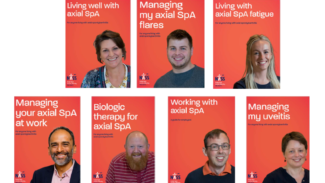
Planning for a family and pregnancy
Read up to date information about planning for a family and pregnancy for people with axial SpA
Read moreRead our community's thoughts on relationships and intimacy for people with axial SpA (AS)
This information is for anyone with axial spondyloarthritis, including people with ankylosing spondylitis
Axial SpA impacts each person in a different way and many people find their condition doesn’t impact their personal relationships at all. However, we do hear from lots of people who would like advice on dating, relationships, intimacy and where to find further support. Generally, it’s a topic that people don’t feel comfortable about discussing publicly, so we’ve put together our best advice from the community.
When you’re dating someone, it can be difficult to know when to disclose to a new person that you have a long-term condition. This is a very personal decision and will depend on how your axial SpA affects you and how comfortable you are sharing with this person.
You don’t owe anyone any information about your health or your axial SpA, but we’ve put together some tips that can be helpful when discussing your condition with someone new or with a long-term partner:
Ultimately, it’s all about getting to know each other at a pace you’re both comfortable with and good communication from early in a relationship is valuable going forwards, regardless of whether someone has a long-term condition or not.
The difference between intimacy and sex: intimacy is an emotional state that brings feelings of connectedness and caring, whereas sex is the physical act. We’ve heard from members of the community who find their axial SpA can affect their levels of intimacy with their partner in a number of ways, for example:
Here are some practical tips that may be worth considering:
The usual advice for pacing activities to manage pain and fatigue apply for all activities – including sex. It may not seem fun or spontaneous but planning ahead can help you limit the impact on your pain or energy levels, and can perhaps build anticipation too. Some things to consider:
Some more practical tips:
Some medications can cause side effects, such as low libido, erectile dysfunction or vaginal dryness. It’s important to speak to your GP or rheumatologist if you’re experiencing any of these.
It’s important to look after yourself emotionally and promote good feelings of self-worth. It’s natural that our bodies change over time but living with axial SpA can cause other changes for some people, such as changes to your posture, the need to use mobility aids and sometimes using joint braces.
It’s natural that it can take time to adjust to these changes but remember that you’re not alone. If you need support with your emotional wellbeing, it can be helpful to speak to your GP, access counselling or perhaps join a support group.
We know these conversations can be difficult to have, but if your axial SpA is having an impact on your relationships and intimacy, it’s important to reach out to your healthcare team for support and specialist advice. This may include your:
For advice and support for LGBTQ+, we recommend Stonewall and Mermaids.
We have more information about supporting your emotional wellbeing and remember you can meet other people with axial SpA at your local NASS branch for social events. If you don’t have a local branch, do get in touch as some branches are holding online events. NASS members can also reach out to our active community on the members forum.

Read up to date information about planning for a family and pregnancy for people with axial SpA
Read more
Read our top tips for people with axial SpA looking after children
Read more
Download our free guides to help you learn more about managing your axial SpA
Download the guides